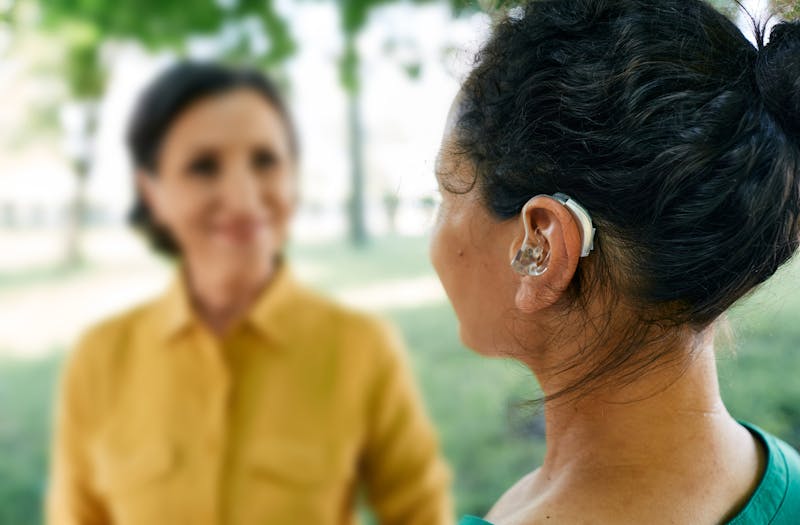
Hearing aids are essential devices for millions of people who rely on them to enhance their hearing and improve their quality of life. However, one common concern among hearing aid users is whether these devices can get wet and, if so, what impact moisture can have on their functionality. Generally speaking, no; hearing aids cannot get wet, but there are some exceptions.
In this blog, the professionals at Louisiana ENT Specialists will explore the risks associated with hearing aids getting wet, the types of hearing aids available, and our best tips for protecting them from moisture damage.
What Happens If Your Hearing Aid Gets Wet
Hearing aids are sophisticated electronic devices that contain sensitive components, including microphones, amplifiers, and speakers. These components are vulnerable to moisture, which can cause various issues, from temporary malfunctions to permanent damage.
Here are some common problems that can arise if hearing aids get wet:
- Corrosion: Moisture can cause the internal components of hearing aids to corrode, leading to irreparable damage.
- Battery Issues: Water can short-circuit the batteries, reducing their lifespan or causing them to stop working altogether.
- Sound Distortion: Moisture can affect the microphones and speakers, resulting in distorted or muffled sound quality.
- Complete Failure: In severe cases, exposure to water can cause the hearing aid to stop working entirely.
Water-Resistant vs. Waterproof Hearing Aids
It's important to distinguish between water-resistant and waterproof hearing aids. While water-resistant hearing aids can handle minor exposure to moisture, such as sweat or light rain, they are not designed to be fully submerged. On the other hand, waterproof hearing aids are specifically engineered to withstand being submerged in water for short periods.
Let’s look at the differences:
- Water-Resistant Hearing Aids: These hearing aids typically have a protective coating or casing that provides a certain level of moisture resistance. They suit individuals who may sweat heavily or live in humid climates.
- Waterproof Hearing Aids: These devices are designed to be fully submerged in water for a limited time. They are ideal for active individuals who may engage in water sports or other activities where their hearing aids could get wet.
Protecting Your Hearing Aids from Moisture
Whether you have water-resistant or waterproof hearing aids, you must protect them from moisture. Here are some of LENTS’ best practices to help safeguard your hearing aids:
- Use a Dehumidifier: Investing in a hearing aid dehumidifier can help remove moisture from your devices overnight, extending their lifespan and maintaining optimal performance.
- Avoid Exposure: Avoid wearing your hearing aids in situations where they might get wet, such as swimming, showering, or during heavy rain.
- Use Protective Covers and Drying Kits: Consider using protective covers or sleeves specifically designed for hearing aids. These can provide an additional layer of protection against moisture. Additionally, portable hearing aid drying kits are available and can help remove moisture quickly if your hearing aids do get wet.
- Wipe Them Down: If your hearing aids are exposed to sweat or rain, wipe them down with a dry, soft cloth as soon as possible.
- Take Battery Precautions: Remove the batteries and open the battery compartment overnight to allow any trapped moisture to evaporate.
What to Do If Your Hearing Aids Get Wet
If your hearing aids do get wet, it is essential to act quickly to minimize potential damage:
- Turn Off and Remove the Batteries: Immediately turn off your hearing aids and remove the batteries. This will help prevent short-circuiting.
- Dry the Exterior: Gently wipe the exterior of the hearing aids with a dry, soft cloth to remove any visible moisture.
- Use Your Dehumidifier: To remove internal moisture, place the hearing aids in a dehumidifier or a hearing aid drying kit.
- Avoid Heat: Do not use a hairdryer, microwave, or any other heat source to dry your hearing aids, as excessive heat can cause further damage.
Louisiana ENT Specialists: Improving Lives with Advanced Hearing Aid Solutions
While hearing aids are essential for many people, they are also delicate electronic devices that require proper care and maintenance. Understanding the risks associated with moisture and taking proactive steps to protect your hearing aids can help ensure their longevity and optimal performance.
By following the best practices outlined in this blog, you can enjoy the benefits of your hearing aids without worrying about moisture-related damage. If you have any questions or concerns about your hearing aids, don't hesitate to contact our ENT doctors at Louisiana ENT Specialists for personalized advice and support at one of our locations. We’re here to help!

